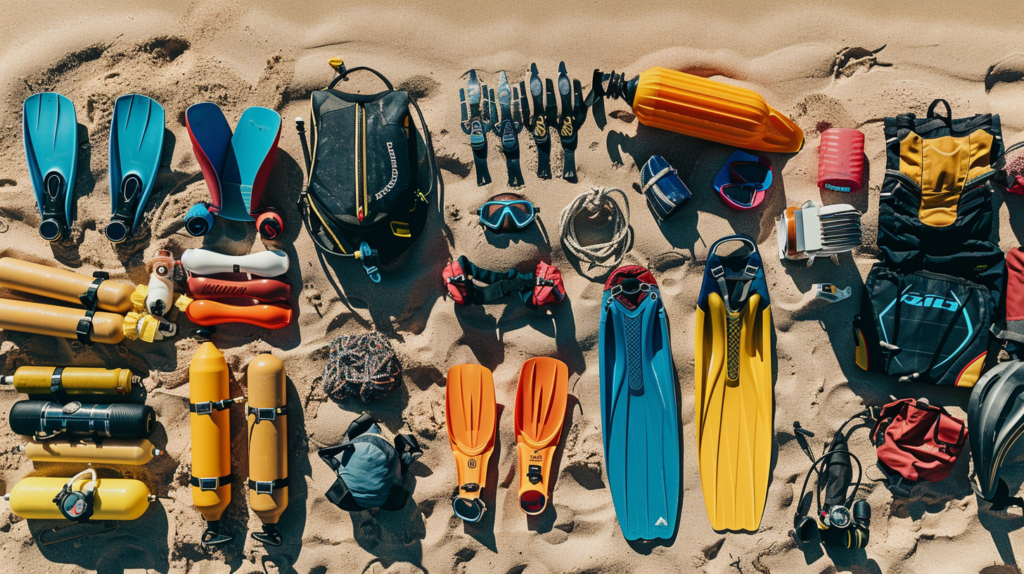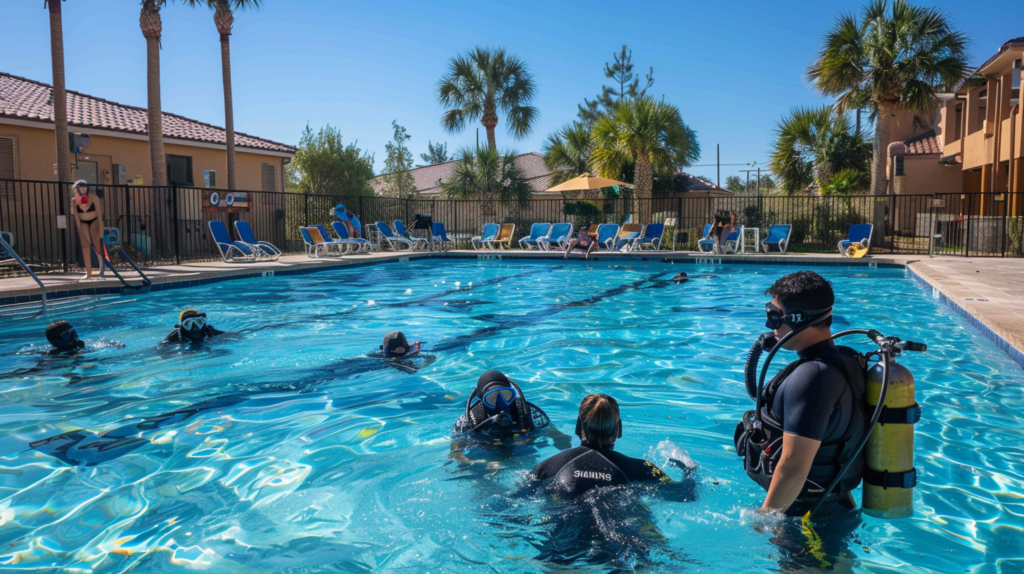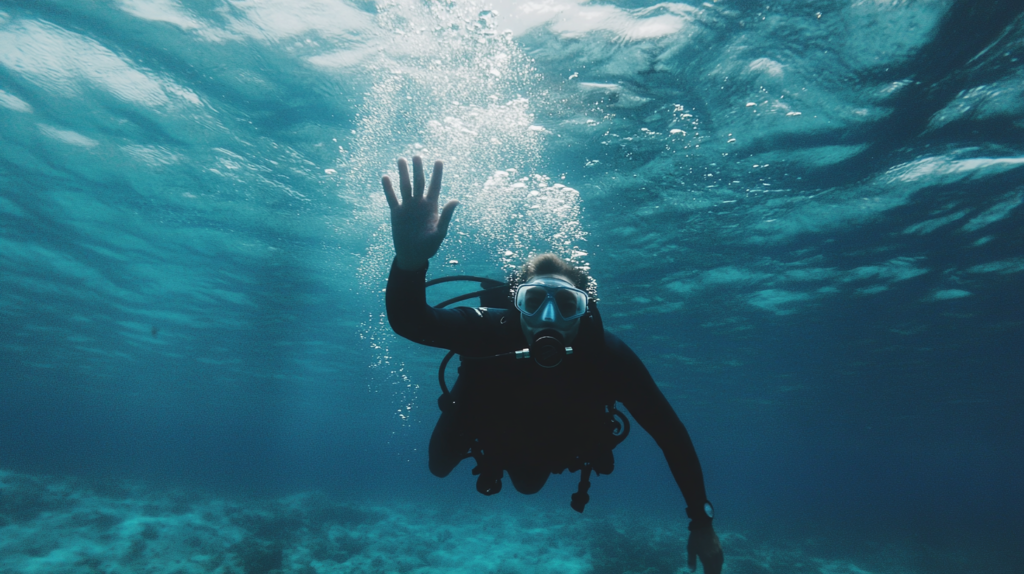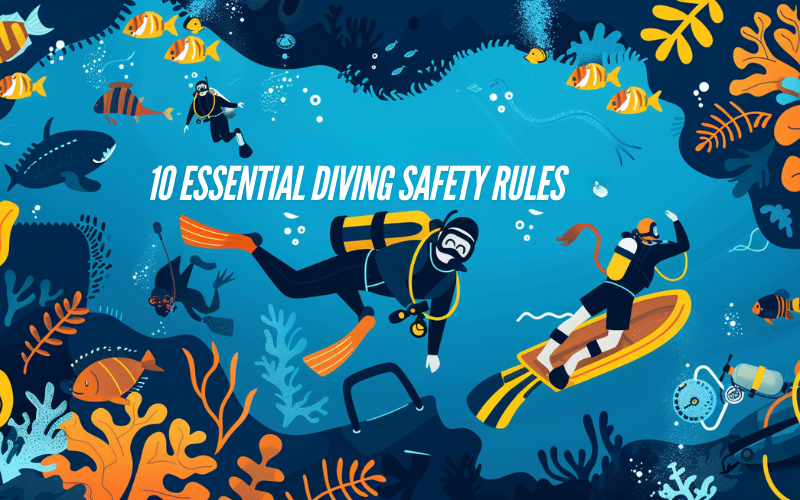Diving is an exhilarating sport that allows you to explore the stunning underwater world. However, it also comes with inherent risks that can jeopardize your safety and enjoyment. Whether you are a beginner or an experienced diver, following essential diving safety rules is crucial for a safe diving experience. In this article, we will discuss ten diving safety rules every diver should adhere to, regardless of their skill level.
Always Dive with a Buddy
One of the fundamental rules of diving is to never dive alone. Always dive with a buddy or as part of a group. Diving with a partner ensures that someone is there to assist in case of an emergency. A buddy system allows divers to monitor each other’s air supply, buoyancy, and overall well-being. Before you dive, establish communication signals and make sure you both understand the dive plan. Having a designated buddy can also enhance the overall experience, as you can share the wonders of the underwater world together.

Tip: Conduct a pre-dive briefing with your buddy. Discuss the dive site, potential hazards, and the plan for communication underwater.
Pre-Dive Safety Checks
Conducting thorough pre-dive safety checks is essential. Both you and your buddy should perform a checklist of your equipment before entering the water. Check your tanks, regulators, buoyancy control devices (BCDs), and masks. The common acronym “BWRAF” can help you remember the key checks:
- B: BCD – Ensure it is functioning correctly, with no leaks.
- W: Weights – Confirm that your weights are properly secured and distributed.
- R: Regulator – Test your regulator for proper function and check for any leaks.
- A: Air – Check your air supply and confirm it is adequate for the planned dive.
- F: Final check – Do a last-minute review of your gear to ensure everything is in order.

Completing these checks can help prevent issues once you are underwater, allowing for a more enjoyable dive.
Equalize Your Ears Early and Often
Pressure changes as you descend, making it vital to equalize your ears early and often. Failing to equalize can lead to discomfort or even injury, such as barotrauma. Start equalizing as soon as you begin your descent. Techniques like the Valsalva maneuver (pinching your nose and blowing gently) can help equalize pressure. Remember to ascend if you feel pain and try again.
Tip: If you struggle to equalize, consider ascending slightly to relieve pressure, then attempt to equalize again. Regularly practice equalization techniques before your dive.
Monitor Your Air Supply
Keeping track of your air supply is critical for safety underwater. Before every dive, check your starting pressure and make a mental note of it. During the dive, periodically check your pressure gauge and communicate with your buddy. A good rule of thumb is to ascend when you have a third of your air supply remaining, allowing plenty of reserve for emergencies.
Tip: Use a dive computer or wrist gauge to help track your air usage and no-decompression limits. Familiarize yourself with your equipment so you can easily read the gauges while underwater.
Ascend Slowly and Perform Safety Stops
When it’s time to ascend, do so slowly to allow your body to adjust to the pressure change. A slow ascent minimizes the risk of decompression sickness (DCS). Perform a safety stop at about 15 feet (5 meters) for 3-5 minutes. This stop allows your body to off-gas nitrogen absorbed during the dive and further reduces the risk of DCS.
Tip: Use your dive computer to monitor your ascent rate. Many dive computers provide visual and audible alerts if you ascend too quickly.
Avoid Alcohol and Drugs Before Diving
Avoid consuming alcohol and drugs before diving, as they can impair your judgment and physical capabilities. Alcohol can lead to dehydration, which increases the risk of decompression sickness. Always be in a clear state of mind and physically fit to ensure a safe diving experience.
Tip: Give your body ample time to recover after drinking alcohol or taking medications. A good rule of thumb is to allow at least 24 hours before diving if you have consumed alcohol.
Stay Within Your Training and Experience Level
Every diver has a different level of training and experience. Stay within the limits of your training and avoid challenging dives unless you have the necessary experience and skills. If you are a beginner, stick to shallow, calm waters. As you gain experience and certifications, gradually explore more advanced dive sites.

Tip: If you are interested in diving in new environments (like caves or wrecks), consider taking specialized training courses. These courses will provide you with the skills and knowledge to handle unique challenges safely.
Pay Attention to Your Surroundings
Being aware of your surroundings while diving is crucial for safety. Keep an eye out for potential hazards, such as strong currents, marine life, and other divers. Maintain a good position relative to your buddy and avoid touching or disturbing the marine environment. Not only does this protect you, but it also helps preserve the delicate underwater ecosystem.

Tip: Always look out for potential escape routes and familiarize yourself with the dive site before descending. Understanding the site can help you avoid dangerous areas.
Know the Signs of Decompression Sickness
Understanding the symptoms of decompression sickness (DCS) is essential for every diver. Common symptoms include joint pain, dizziness, difficulty breathing, fatigue, and chest pain. If you or your buddy experience any of these symptoms after a dive, seek immediate medical attention. Being aware of these signs can save lives.

Tip: After diving, always stay within a safe distance of the dive site and avoid strenuous activities for several hours to reduce your risk of DCS.
Get Regular Training and Refresher Courses
Lastly, regular training and refresher courses can help maintain your diving skills and knowledge. Diving technology and techniques continually evolve, and staying up-to-date ensures your safety. Consider taking refresher courses if you haven’t dived in a while or after significant changes in your diving experience.
Tip: Join local dive clubs or communities to engage with other divers. Sharing experiences and knowledge can enhance your skills and keep you motivated.
Frequently Asked Questions (FAQ)
What should I do if I get separated from my buddy?
If you become separated from your buddy, stay calm and look for them for a few minutes. If you cannot find them, ascend slowly to the surface and wait there. Avoid descending again until you can find your buddy.
How often should I check my air supply during a dive?
You should check your air supply regularly throughout the dive, ideally every 10-15 minutes or whenever you are aware of your surroundings. Always be conscious of your air levels.
What is decompression sickness, and how can I prevent it?
Decompression sickness occurs when nitrogen bubbles form in the body due to a rapid ascent. You can prevent DCS by ascending slowly, making safety stops, and avoiding strenuous activity before diving.
Are there any specific conditions that make diving unsafe?
Yes, certain conditions like strong currents, poor visibility, and bad weather can make diving unsafe. Always assess the conditions before diving and consult local dive shops for advice.
What gear is essential for safe diving?
Essential diving gear includes a wetsuit or drysuit, buoyancy control device (BCD), regulator, mask, fins, and a dive computer or depth gauge. Each piece of equipment plays a vital role in ensuring your safety underwater.
Conclusion
Diving can be a rewarding and thrilling experience when conducted safely. By following these ten diving safety rules, divers of all levels can enhance their safety and enjoyment underwater. Remember that safety comes first, and taking the necessary precautions ensures a fulfilling dive experience. Dive smart, stay safe, and explore the wonders of the underwater world with confidence!


